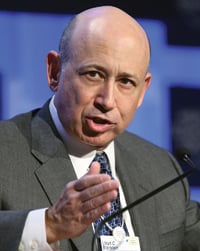Just how out-of-touch can Lloyd Blankfein be?
The Goldman Sachs Group Inc. chief executive officer vigorously denied the Securities and Exchange Commission fraud suit filed Friday against his firm, calling the complaint “completely unfounded in law and fact.” The company promised to “defend the firm and its reputation.”
But head-in-the-sand denials will no longer work. If Blankfein wants to save what is left of Goldman's reputation, and possibly his job, he should admit that the deal described in the SEC complaint was wrong. Then, he should draw a very firm line so that Goldman doesn't deceive its customers again.
As only someone from Mars doesn't know by now, Goldman allegedly sold collateralized debt obligations, or bonds backed by mortgage securities, to institutional investors without disclosing that the specific securities were handpicked by hedge-fund manager John Paulson. Paulson was betting on the securities to fall and, for that reason, structured the securities to include losers -- not winners.
For instance, he ordered that no bonds backed by Wells Fargo & Co. mortgages be included in the pool because Wells Fargo was one of the few mortgage lenders that stuck to sound lending.
Goldman says it had no idea whether the mortgage securities would go up or down. Maybe. But the SEC complaint quotes a Goldman employee, also named as a defendant, gleefully chortling, “The whole building is about to collapse anytime now.” By the time the deal closed, in April 2007, the subprime market was already in trouble. Defaults were skyrocketing. And by the following January, no fewer than 99 percent of the mortgages in the CDO had been downgraded.
Goldman says it lost $90 million on the deal. If true, that might be its strongest defense.
However, Goldman's investment forecast matters less than its allegedly faulty disclosure. Internally, it referred to the bonds at issue as “the Paulson portfolio.” But outside investors weren't told that this much-respected -- and much- feared -- short-seller had selected the bonds, or even that he was involved. Instead, Goldman recruited a neutral third party to bless the deal, and investors were told that this party, ACA Management LLC, had selected the mortgages.
It might be that every fact in the SEC complaint is untrue, in which case Blankfein is right to defend and I am dead wrong. But the complaint is rich in detail, and builds on a book, Gregory Zuckerman's “The Greatest Trade Ever,” and on exclusive reporting in the New York Times that laid out a similar story.
If the SEC's facts are true, the case is ugly for Goldman. In capsule form: At Paulson's urging, Goldman structured a security so Paulson could short the mortgage market. Goldman found patsies to take the other side, and Paulson paid the firm a $15 million fee.
Goldman's behavior reminds me of NBC television, which in 1992 aired a video of a pickup truck explosion that turned out to have been staged. After a lawsuit by General Motors Co., NBC apologized on air.
In the present case, Goldman staged a CDO to explode.
Another example: in 1991, a Salomon Brothers trader lied to the government. Though no investor fraud was involved, the CEO, John Gutfreund, was forced to resign merely because he had waited a few months before reporting the incident. The new interim CEO, Warren Buffett, publicly apologized. He insisted then that in the future Salomon Brothers would be “way, way away from the line.” He wanted it to steer clear of any behavior that was even remotely questionable, much less illegal.
Should Goldman aspire to any less? The same Buffett's Berkshire Hathaway is an investor in Goldman. It would be nice to hear Buffett endorse his principles with respect to Goldman now. (Disclosure: I am investor in Berkshire.)
Either way, Blankfein should deliver a public apology. Stonewalling, dissembling or parsing the facts won't restore Goldman's name. Goldman may also have to settle with investors who lost money on this and any similar deals. It will cost Goldman money but it will be worth it.
Finally, Goldman needs to look in the mirror and ask how a firm long known for its stellar reputation and ethics could have gone so wrong. My own theory is that three steps in the firm's evolution eroded the class that Goldman once stood for.
First, when the firm was sold, ending its days as a partnership, in 1999, managers gradually began to think of Goldman as a public stock rather than their private firm.
Second, Goldman became more of a trader, less an investment banker. Bankers think long-term, traders short-term. Last year, 76 percent of its revenue was from trading and for investing for its own account.
Finally, the shift toward trading was duplicated in Goldman's upper management, which formerly was divided between both camps. Since Blankfein took over in 2006, traders have dominated.
Goldman, of course, will say it still cares about reputation. Tell that to IKB Deutsche Industriebank AG. In 2006, the German bank specifically told Goldman it was no longer comfortable investing in CDOs that didn't “utilize a collateral manager, meaning an independent third-party,” according to the SEC's complaint. Goldman told IKB it had such a manager -- ACA. It didn't mention Paulson. IKB lost almost all of its $150 million investment.
Goldman's exploded CDO already may have changed the future of Wall Street. The case seems certain to speed financial overhaul legislation through Congress. The question is whether that CDO will change -- or threaten -- the future of Goldman as well.







